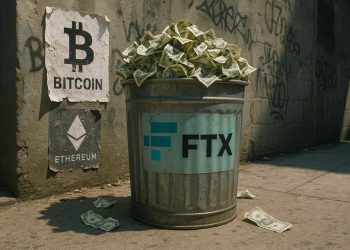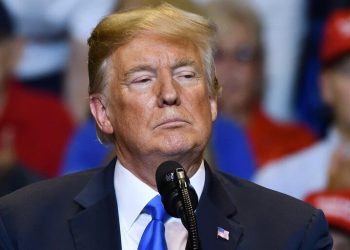On this episode of “The Opinions,” the former president of Harvard University and former U.S. Treasury secretary explains the dangers of President Trump’s economic policies, and why we should expect more instability ahead.
Below is a transcript of an episode of “The Opinions.” We recommend listening to it in its original form for the full effect. You can do so using the player above or on the NYT Audio App, Apple, Spotify, Amazon Music, YouTube, iHeartRadio or wherever you get your podcasts.
The transcript has been lightly edited for length and clarity.
Larry Summers: I’m Larry Summers, I’m a professor of economics at Harvard University and formerly the Treasury secretary of the United States. I’ve been involved in following and advising with respect to global financial turmoil for the last four decades.
President Trump has proposed what are, by far, the most radical trade policies and probably the most radical, rapid change in economic policies that the United States has announced since the Second World War.
Markets have freaked out. I think most participants in markets would agree that if you look over the last 25 or 40 years, this past week was certainly among the top 1 percent in terms of scary developments. It’s probably not the worst — like the financial crisis or right after the pandemic — but it’s the next thing to that.
The big difference is that previous turmoil, previous crises, have come because something bad was happening in the world. This one is self-inflicted. When things looked scariest last week, the president announced a pause on a portion of the tariffs. That stanched a bit of panic, but it would be a big mistake to think we are out of the woods because tariff levels are still at once in century levels in terms of what they’re taking out of the economy and the punitive level of tariffs on China creates an entirely unprecedented situation.
We have huge uncertainty; we do things on a Wednesday that we said on Tuesday that we would never do. When you’re dealing with someone who shows themselves not to be able to make and keep promises, you operate much more carefully and gingerly, and that’s how everybody’s going to be operating with respect to the United States.
The pause is certainly better than if we had simply charged along on the catastrophic path that we’re on, but anybody who thinks the genie is back in the bottle and that it’s all now OK should reconsider their position.
The U.S. has traditionally been a bastion of strength. When the world gets riskier, people put their money into dollars, people put their money into U.S. bonds — that’s the American pattern.
There’s a very different pattern for emerging and submerging markets. In countries that are not seen as bastions or countries that some people would call banana republics, people get nervous about them and everything goes down. Stocks go down, bonds go down, bond interest rates go up, the currency goes down.
What has people most scared is that the U.S. has switched its pattern from being a bastion of strength to trading like an emerging market. And that’s a pretty profound thing because it takes decades to build up credibility, but it can be lost in a matter of days or weeks.
If the United States isn’t credible, that makes the whole financial system less stable, and it means higher interest rates for Americans, whether it’s the government borrowing to finance massive deficits, or people with respect to their mortgages. This is all pretty scary and most scary for working families, as now a majority of experts think a recession this year is more likely than not.
Nobody can predict the economy with high confidence. That’s always true, and it’s especially true right now, but my judgment is that it’s probably six in 10 or better that a recession will start this year.
A recession of the kind that we’re likely to have is probably not the kind of catastrophe we saw with the pandemic. It’s probably not as dramatic as we saw with the financial crisis when unemployment got above 10 percent, but I think that it probably would mean unemployment rising by at least two percentage points, perhaps to 6 percent or more.
It would mean the loss of several percentage points of G.D.P. or more than a trillion dollars, and it would certainly mean much greater losses for retired people with portfolios than we’ve seen so far.
Frankly, I think that we are more vulnerable to bad surprises from here than to good surprises. The market is still assuming that we’re not really going to see 100 percent tariffs on China for any length of time, because if we did, there would be enormous disruption to the American economy’s ability to produce. So if what the president is talking about actually happens, then there’s room for another major leg down as a consequence of that.
Here’s the problem: President Trump got elected for a reason. There’s a real set of concerns about jobs in the heartland, what some people call the Rust Belt of our country. There’s a real set of challenges for people who work with their hands. The problem is that this policy mix does not address any of those concerns and will make them worse.
I heard Secretary Lutnick [Howard Lutnick, the secretary of commerce] suggesting the other day that it would be great if we could be the place where iPhones were assembled. Well, maybe the people he talks to at the bond trading investment firm from which he hails have a different perspective, but I haven’t met many Americans who are eager for the kinds of jobs that exist in China, assembling iPhones, and I think building an economic strategy around that is an arrogant, elitist, confused approach.
This is a general principle in life: as the economy gets more complicated for people, for businesses and for countries, strategy needs to be more about building on strength than compensating for weakness, and our strategy in the United States should be building on the things that we are able to do that people in other parts of the world have a lot of trouble doing.
Look, I spent a certain part of my career talking about how it was important to achieve convergence between Latin American democracy and North American democracy. The idea was that in Latin America, too often, government by the people had ended up being government against the people. The iconic example was President Juan Perón after the Second World War in Argentina. When he came into office, people thought Argentina had very bright prospects ahead. But when his economic strategy was about keeping foreign products out to develop local industry, when his macroeconomics were about taking over the central bank and running up big budget deficits and when his approach was crony capitalism, working closely with chosen business leaders on products that were in their interest when his desire was to move forward, the result was a calamity for Argentina.
And what I find so tragic is that it’s looking increasingly like I was right to think about convergence between democracy in South America and North America. But it’s taking the form of American democracy getting more like South American democracy. And that is very costly, not just for our prosperity, but for our security.
We know the first rule of holes is stop digging. We are in a hole that we have made. If we stop digging, the situation is less serious than if we continue to dig.
So anything the president can do to signal that the goal is not to accuse the whole world of having exploited the United States over the last generation, but instead to target key sectors — like semiconductors, like pharmaceuticals — if this became focused and strategic rather than wholesale, indiscriminate and angry, I think it would send positive signals that would improve the prospects of our economy.
Thoughts? Email us at theopinions@nytimes.com.
This episode of “The Opinions” was produced by Derek Arthur. It was edited by Alison Bruzek and Kaari Pitkin. Mixing by Carole Sabouraud. Original music by Pat McCusker, Efim Shapiro and Carole Sabouraud. Fact-checking by Mary Marge Locker. Audience strategy by Shannon Busta and Kristina Samulewski. The director of Opinion Audio is Annie-Rose Strasser.
The Times is committed to publishing a diversity of letters to the editor. We’d like to hear what you think about this or any of our articles. Here are some tips. And here’s our email: letters@nytimes.com.
Follow the New York Times Opinion section on Facebook, Instagram, TikTok, Bluesky, WhatsApp and Threads.
#Opinion #Larry #Summers #Trump #Rule #Holes #Stop #Digging




















